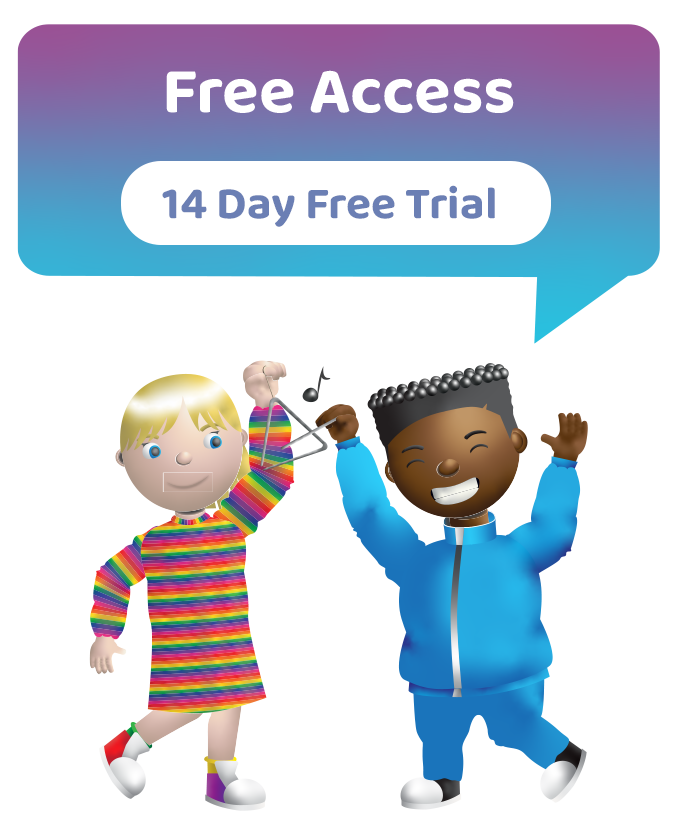Hullabaloo! Primary Music Curriculum and the Primary Music Curriculum in Northern Ireland
The music curriculum in Northern Ireland is shaped by the educational framework provided by the Department of Education and the Council for the Curriculum, Examinations, and Assessment (CCEA). The curriculum aims to provide pupils with opportunities to develop their musical skills, knowledge, and understanding across a range of areas. Just like Hullabaloo!
The key features of the music curriculum in Northern Ireland match perfectly with those in Hullabaloo! Primary Music Curriculum.
Curriculum Structure
The music curriculum is structured to provide a balanced and progressive learning experience for pupils.
Through Hullabaloo! Music, pupils engage with all elements of music in a planned, step-by-step progressive way. Music should be experienced in balance across all forms – written, played and appreciated aurally.
Learning Areas
The curriculum covers various aspects of music education, including performing, composing, listening, and appraising music. Pupils have opportunities to engage with a wide range of musical genres, styles, and traditions, both from within Northern Ireland and from around the world.
Cultural and stylistic diversity is at the heart of Hullabaloo! Primary Music Curriculum.
With an eclectic mix of genres, and exposure to a range of music to broaden their repertoire,
Providing examples of music from a range of countries, Hullabaloo! recommends that schools still include their own repertoire of songs and music which are important to reflect their local heritage and culture, as they deem appropriate.
Skills Development
The curriculum aims to develop pupils’ musical skills and competencies across different areas, such as instrumental and vocal performance, composition, improvisation, and music technology. Pupils are encouraged to develop their creativity, expressiveness, and musical fluency through practical activities and exploration.
Pupils are encouraged to practise skill building across a range of engaging, fun activities throughout the Hullabaloo! Music scheme of work. These skills comprehensively cover all the above facets of music-making, including an instrumental strand (recorder) in P3 and P4, which helps pupils contextualise and apply their prior knowledge.
Integration with Other Subjects
Music is often integrated with other subject areas, allowing pupils to make connections between music and other areas of learning. For example, pupils may explore the historical and cultural context of music in history or learn about the science of sound in physics.
In Hullabaloo! Primary Music Curriculum, opportunities for inter-disciplinary working are clearly highlighted in the cross-curricular links sections within each teaching unit. These include subjects such as science, history and geography, as appropriate.
Assessment and Progression
Mechanisms for assessing pupils’ progress in music and providing feedback on their achievements is important as part of the learning process. Assessment approaches may include practical performances, composition portfolios, listening exams, and written assignments. Progression pathways are provided to support pupils as they advance through their musical studies.
Assessment is central to Hullabaloo! Primary Music Curriculum, with assessment opportunities built into each teaching unit, along with end of year assessment criteria.
Inclusive Approach
The curriculum is designed to be inclusive and accessible to all pupils, regardless of their background or ability. It recognizes the importance of diversity and cultural relevance in music education and aims to provide a supportive and welcoming learning environment for all pupils.
The practical, relevant nature of Hullabaloo! means that learning is inclusive and enjoyed by all learners. Active engagement is key to understanding concepts and participating in music-making.
Overall, the music curriculum in Northern Ireland aims to provide pupils with a rich and meaningful musical education that fosters a lifelong appreciation for music and equips them with the skills they need to engage actively in musical activities both within and beyond the classroom.









